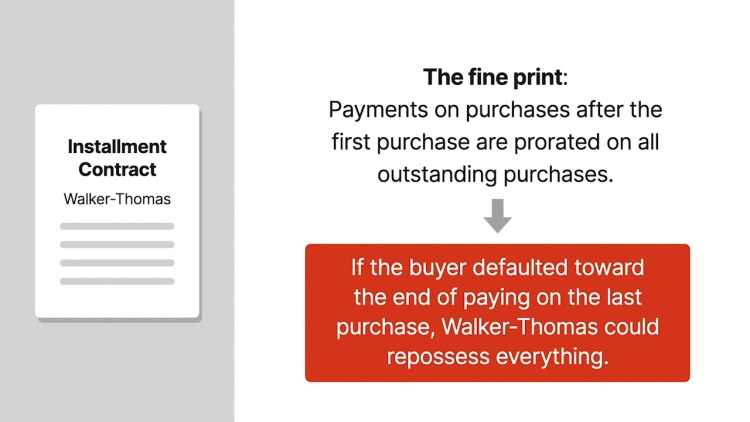Williams v. Walker-Thomas Furniture Co.
District of Columbia Court of Appeals
198 A.2d 914 (1964)
- Written by Megan Petersen, JD
Facts
Williams (plaintiff) is a single mother of seven children. She has limited education and lives off of public assistance amounting to a $218.00 monthly government stipend. Walker-Thomas Furniture Co. (Walker) (defendant) sells furniture within the District of Columbia. Over several years, Williams purchased fourteen pieces of furniture and household items from Walker using Walker’s installment plan. Williams believed that the terms of the installment plan permitted her to pay off items as she purchased them, and simultaneously continue purchasing additional items. The contracts Walker required Williams to sign, however, provided different terms. Williams signed fourteen separate contracts for her furniture purchases. Each contract contained fine print stating that any payments made by Williams, following her first purchase, were to be prorated on all purchases then outstanding. The effect of this system was to keep a balance due by Williams to Walker on all items purchased until the overall balance was completely eliminated. Thus, based on the contracts she signed, Williams never received title to the items purchased from Walker because she never completely paid down her balance. Williams eventually reduced her balance owed to $164.00, but then she purchased a stereo from Walker for $514.00. This raised Williams’ balance due to $678.00. Williams signed a contract for the purchase of the stereo which listed on its reverse the name of her social worker and the amount of her $218.00 per month government stipend. Williams eventually defaulted on her payments, and Walker sought a writ of replevin in District of Columbia court for the return of all items purchased by Williams. The trial court upheld the contracts retaining title to the items in Walker, and entered judgment for Walker. Williams appealed.
Rule of Law
Issue
Holding and Reasoning (Quinn, J.)
What to do next…
Here's why 908,000 law students have relied on our case briefs:
- Written by law professors and practitioners, not other law students. 47,100 briefs, keyed to 996 casebooks. Top-notch customer support.
- The right amount of information, includes the facts, issues, rule of law, holding and reasoning, and any concurrences and dissents.
- Access in your classes, works on your mobile and tablet. Massive library of related video lessons and high quality multiple-choice questions.
- Easy to use, uniform format for every case brief. Written in plain English, not in legalese. Our briefs summarize and simplify; they don’t just repeat the court’s language.





